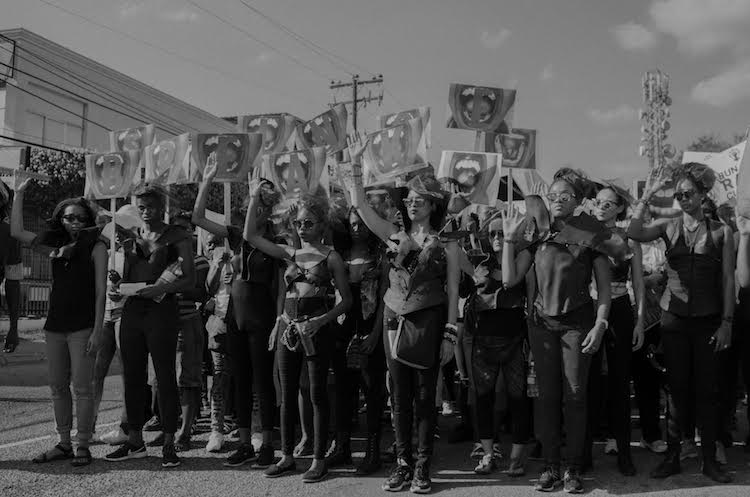By Desmond Brown
KINGSTON, Jamaica (ACP-IDN) – In the wake of an alarming upsurge in domestic violence and abuse of women and girls, a new group has emerged here with the promise of a revolution for social change, combating gender-based violence in particular – the “Tambourine Army”.
On its Facebook page, the Tambourine Army describes itself as a radical social-justice movement committed to uprooting the scourge of sexual violence and safeguarding the rights of women and girls.
The group first came to public attention on Sunday, February 8, when 14 women staged a peaceful protest at the Nazareth Moravian Church in the central parish of Manchester, rallying support for a 15-year-old St Elizabeth school girl allegedly abused by the pastor of the congregation.
One of the protesters reportedly used a tambourine to hit the then leader of the Moravian Church in Jamaica, Dr Paul Gardner, on the head, and the hashtag #TambourineArmy soon became popular on Jamaican social media in reference to the incident.
“This is not an army that fights with guns and M16s — though they are militant about their cause,” wrote former Jamaican senator and self-described changemaker Imani Duncan-Price in a recent op-ed in the island’s The Gleaner newspaper.
“The aim: to finally make Jamaica safer for women and girls, to deal systematically with the scourge of violence against children and women.”
More than two dozen women were murdered in Jamaica in 2016 and, according to Acting Commission of Police Novelette Grant, a little over 1,400 perpetrators of crimes against women and children over the past 13 months have been arrested.
Attorney-at-law Lord Anthony Gifford, QC, said the Tambourine Army raises a number of constitutional issues that are fascinating for a human rights lawyer to disentangle.
“Issue #1: Women and children are being constantly abused. Most of the worst violations of human rights occur within the home. Men who think they are stronger, including pastors who claim to be interpreters of the Word of God, abuse their power and think they are beyond the reach of justice. It has to stop, and as in many civil rights struggles, the abused are fed up with pious talk that has changed nothing.
“Issue #2: We enjoy the right of free speech and use it all the time, in talk shows and on social media, and on the street. It is a precious right that allows us all to vent our grievances and campaign for change. In the old days in Britain, they used to charge those who agitated for reform with ‘criminal libel’. In Jamaica, the offence of criminal libel was abolished by the Defamation Act 2013. But is it now returning in another form?
“Issue #3: We live under the rule of law, and the justice system should be there to ensure that crimes are reported and investigated, and the perpetrators punished. The presumption of innocence means that we should not label people as guilty until they have been so found after a fair trial. But the system is creaking. Cases take ages to be heard. Most judges do their best to do justice, but the ordeals faced by both victims and accused on the road to justice are often intolerable.”
On March 11, the Tambourine Army organised it debut national protest march against domestic violence, and Gifford said he fully supports the group.
“The issue of violence and sexual abuse cannot be resolved only by talk and no action. Men, too, should be part of the struggle to bring about true equality in relationships, and true care and protection for our children,” he said.
But noted obstetrician, gynaecologist, comedian and poet Michael Abrahams said he does do not agree with some of the tactics employed by the movement.
“The name ‘Tambourine Army’ arose after co-founder Latoya Nugent hit a pastor who is an alleged predator on the head with a tambourine. That was an assault, and I have reservations about naming the movement after such an incident,” Abrahams said.
“I also have reservations about the #SayTheir Names campaign that they initiated, in which victims are urged to publicly ‘name and shame’ alleged perpetrators, as persons with axes to grind can use the opportunity to smear the names of innocent people, even before making formal reports to the relevant authorities.”
Several persons voicing disagreement with the tactics being used by the Tambourine Army, including human-rights advocates sympathetic to their cause, have also been publicly cursed and disrespected by Nugent in social media.
On March 14, Nugent was arrested and charged with three counts of using a computer for malicious communication under section 9 (1) of the Cybercrimes Act of 2015.
Nugent allegedly published information on social media maligning several individuals as sexual predators, leading to formal complaints to the police by some of them.
“The women of the Tambourine Army see themselves as militant warriors who have decided that enough is enough and that it is time to rebel and start a revolution,” Abrahams said.
“Many people are hurting from the sequelae of child abuse, and when people hurt, are marginalised, and are denied justice, their pain will be manifested as anger.”
Then, he noted, there will come “a breaking point when the rules of the society that has failed them will be ignored and they will blaze their own trail. Their actions will offend and hurt some, and there will be casualties and collateral damage.
“Rebellions and revolutions are never pretty. Warriors are not here to play nice. The abuse of children has become normalised in our society, and if this were not the case, the Tambourine Army would not exist.” [IDN-InDepthNews – 28 March 2017]
Photo: Members of the Tambourine Army during their March 11 protest. The radical social-justice movement is fighting gender violence and rape culture in Jamaica.
Note: This report is part of a joint project of the Secretariat of the ACP Group of States and IDN, flagship agency of the International Press Syndicate

